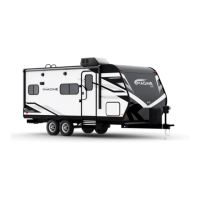15
Plumbing Systems
Water Heater, 6 - Gallon (If So Equipped)
It is important to know which type of Water Heater is installed
in your RV. Read all safety and operating information provided
both here and in the manufacturer’s manual before using the
water heater. The water heater is designed to heat water quickly
and eciently. It’s temperature is preset by the manufacturer. Your
RV’s water heater is turned ON & OFF on the Monitor Panel.
DO NOT operate the Water Heater while empty.
This can result in damage to the tank and/or controls
that is NOT covered under the warranty.
• CHECK that the Water Heater is filled with water before use;
• ALWAYS open both the hot and cold water faucets when
filling the fresh water tank to allow air pockets to be forced
out of the water heater.
Draining and winterization
• If the RV will be stored over the winter, the Water Heater
must be drained to prevent damage from FREEZING.
• When WINTERIZING, it is recommended to bypass the
Water Heater and remove the Anode Rod (if equipped),
particularly if introducing RV antifreeze into the plumbing
system.
Odor from the hot water system
The running water from some fresh water sources may have a
rotten egg smell. This is known as sulfur water. The oder is caused
by Hydrogen Sulfide gas (H
2
S) in the water, usually the result of
bacteria or chemical action. Generally, sulfur water is not harmful,
only unpleasant to smell. Hydrogen Sulfide (rotten egg) odor
is not a service problem.
See page 162 in your Owners Manual, Basic Troubleshooting,
Water Heater. Also refer to the water heater manufacturer's
owner manual for details on flushing to remove unpleasant odor.
High altitude deration
Your water heater is designed to work at elevations up to 4500 ft.
above sea level. At higher altitudes there is less oxygen in the air.
An inadequate supply of oxygen causes the air-fuel mixture to be
out of sync, which compromises combustion and can produce
Carbon Monoxide. At higher elevations, the water heater may
require derating (a modification to compensate for the lack of
oxygen in the air).
If you smell propane gas,
STOP immediately!
Follow the procedures listed
in the Propane System
section of this manual
before attempting to
operate the water heater.
Hydrogen gas may result
if you have NOT used
the water heater for
two weeks or more.
HYDROGEN GAS IS
EXTREMELY FLAMMABLE.
To reduce the risk of injury
under these conditions,
open the hot water faucet
for several minutes at the
kitchen sink before you use
any electrical appliance
connected to the hot water
system.
If hydrogen is present, you
may hear what sounds like
air escaping through the pipe
as the water begins to flow.
Hydrogen gas may be
present even after water has
been drained from the water
heater tank.
Open the faucet at the sink
and allow the system to vent
for five to ten minutes.
DO NOT smoke or have any
open flame near the open
faucet while venting.
On DSI water heater models,
make sure the switch is OFF.

